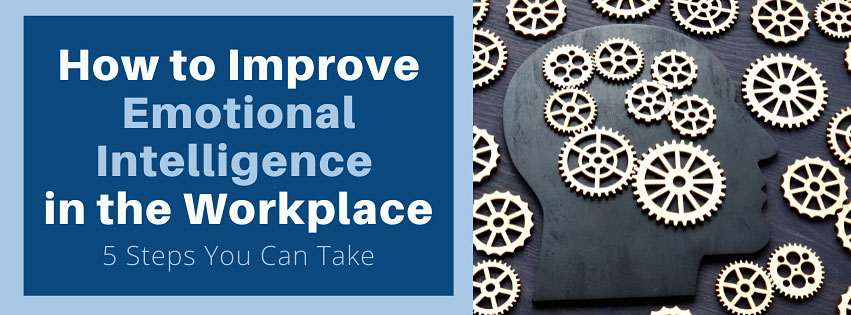
Why is emotional intelligence important in the workplace?
Those with effectively functioning emotional intelligence are:
=> more likely to engage and communicate in ways that maintain and build social connection
=> able to problem solve when stress or emotions are involved
=> can regulate their thoughts and behaviours to make good decisions under a variety of stressful or emotional circumstances
These are all skills that are critically important in all our workplaces. Developing Emotional Intelligence or EI in our teams is a great way in which we can become self and team aware and develop these important soft skills that we need more than ever in our workplaces.
Defining Emotional Intelligence
We wrote more about the 5 main emotional intelligence characteristics. But what is EI? It is important to get clear about what emotional intelligence is and is not. These lists are adapted from the EQ Edge,
Emotional Intelligence is: set of emotional and social skills that collectively establish how well we:
=> Perceive and express ourselves
=> Develop and maintain social relationships
=> Cope with challenges
=> Use emotional information in an effective and meaningful way
Emotional Intelligence is NOT: any of the below:
=> Your IQ or intellectual intelligence, which is mostly set by the time you reach adulthood.
=> EI is not set: your EI can be developed and grown
=> An indicator of your proficiency or your personality
When your workplace operates with effective emotional intelligence, people are aware of and able to effectively manage their own emotions. They are also aware of the emotional and social needs of others, as well as being able to cope with stress and decision making in effective ways.
There are 5 reasons why your team can benefit from increasing your emotional intelligence that we posted about previously. In short, developing EI throughout your workplace:
=> builds relationships and trust
=> raises self and team awareness
=> increases effective communication
=> contributes to better mental health
=> improves overall feelings of support
Do you know any team who doesn’t want that?!! Now that we’ve hopefully established what EI is and how developing it within your team benefits your workplace here are:
5 Ways to Improve Emotional Intelligence in Your Workplace or Team
1) Emotional Intelligence Training Workshops with personalized assessment: Summit Team Building has 20+ years of experience building and supporting high performance teamwork. Workshops designed around developing Emotional Intelligence are offered both virtually and in person. Emotional Intelligence training workshops are customized to your team’s needs. Personal reflection, action planning and accountability within the team will help to extend the learning and build trust within the team. This is the most comprehensive option to develop EI within and throughout your whole team with the side benefit of the connections and relationships it nurtures.
2) Set Clear EI Goals Together: Regardless of whether you’re able to get your whole workplace to engage in an EI workshop with a comprehensive assessment, through conversation – teams can set personal and team growth goals with specific, measurable action steps around the 5 main EI competencies. Use a portion of a monthly meeting to assess progress and tweak goals as needed. Set up coaching buddies to hold each other accountable in between meetings.
3) Build Self Awareness by Reflecting and Getting Curious: Ask your team to keep an electronic or paper journal at work to reflect on all situations and interactions where they notice emotions (sometimes emotions are described or experienced as stress). Try and do this immediately after each situation so you can shorten the time it takes for you to notice emotions until you are aware of what is going on in your mind and body as it is happening. Withhold judgement on your feelings. Instead, continue to grow your awareness of people and situations where you feel threatened, defensive, joy or light heartedness, shame, anger, excitement, etc. All emotions! And get curious about it. What patterns do you notice over time? What do you notice about your biases or assumptions? After you’ve done this for a couple of months, ask yourself, In what situations do emotions work for me? Against me?
4) Listen deeper and embrace feedback: So often we are formulating a response as someone else is talking instead of fully listening to what they have to say. Ask questions to make sure you understand. Understanding is more important than a quick response. If you notice yourself formulating an answer while someone else is talking, set that thought aside and regain focus on the other person. Rephrase or summarize what you’ve heard with a learning mindset. Again, withhold judgement as you seek to understand on a deeper level.
5) Create team norms around Emotional Intelligence: Team norms happen whether we’re conscious of them or not. Norms help regulate what is acceptable team behaviour. If we build norms around emotionally intelligent behaviour (for example it could be expected that all individuals have self reflection work practices, or monthly EI peer coaching check ins, or regular reflection questions such as are we being too nice? Overly assertive?) individuals are more likely to behave and grow in emotionally intelligent ways.
Even if you can describe the landscape of your team to be generally effective and engaged, we can always be developing, growing, and maintaining high performance in our teams. Emotional Intelligence is one great way to consciously do that.
As always, we’re here to help

